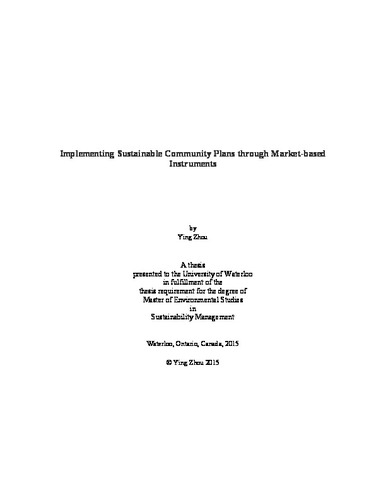| dc.contributor.advisor | Clarke, Amelia Caroline | en |
| dc.contributor.author | Zhou, Ying | |
| dc.date.accessioned | 2015-10-09 20:11:42 (GMT) | |
| dc.date.available | 2015-10-09 20:11:42 (GMT) | |
| dc.date.issued | 2015-10-09 | |
| dc.date.submitted | 2015-10-04 | |
| dc.identifier.uri | http://hdl.handle.net/10012/9813 | |
| dc.description.abstract | Sustainable community development has gained momentum in recent years in order to address complex environmental, social and economic problems at the local level. Municipalities and communities are also becoming interested in the implementation of sustainable community plans. These plans are sometimes called integrated community sustainability plans (ICSPs), local agenda 21s, or may be part of a municipal official/master plan. They generally include environmental goals on: transportation, water, waste, air quality & energy, climate change, food security, ecological diversity and/or land use. Although there are over 1000 of these plans in Canada and over 10,000 worldwide, it is becoming increasingly difficult to ignore the gap between formulating and implementing such plans. The focus of this research is on the potential use of Market-Based Instruments (MBIs) for implementing sustainable community plans.
Many researchers have investigated the importance of price signals and market-based mechanisms for sustainability. These studies have highlighted the need for Market-Based Instruments as a means for sustainability. Literature discusses the importance of a sustainable community plan for sustainable development and the benefits of Market-Based Instruments for communities. From this review, existing Market-Based Instruments were synthesized and a preliminary set of Market-Based Instruments was developed, for the creation of a Sustainability Alignment Methodology (SAM) tool.
SAM tool that was developed for this research, is one which considers Market-Based Instruments under municipal jurisdiction. It might help to achieve the environmental goals in a sustainable community plan. The framework of the developed SAM was deductively tested with publicly available information from two mid-size Ontario communities - the city of Kingston and the Region of Waterloo. Further inductive findings were collected through focus groups with key municipal staff. These two communities were chosen from across Ontario based on a set of criteria. The focus groups gained information on the list of market-based instruments, the categorization of the market-based instruments and the set of scoring criteria. The preliminary version of the SAM tool found acceptance during the focus groups, with some recommendations for revision – such as the exclusion of the scoring criteria. Based on these findings, the preliminary draft of the SAM tool was revised to be more user-friendly.
The revised version contains over 50 Market-Based Instruments across eight different environmental topics and identifies the municipal departments associated with these MBIs. This study makes an important contribution to sustainable community development by equipping municipal governments with a better understanding of market-based instruments and providing a useful tool for helping implement their sustainable community plans. It also contributes theoretically to our understanding of MBIs that are applicable at the local level. | en |
| dc.language.iso | en | en |
| dc.publisher | University of Waterloo | |
| dc.subject | Market-Based Instruments | en |
| dc.subject | Ecofiscal | en |
| dc.subject | Environmental Pricing | en |
| dc.subject | Implementation | en |
| dc.subject | Market Approach | en |
| dc.subject | Market Mechanism | en |
| dc.subject | Sustainable Community Plan | en |
| dc.subject.lcsh | sustainable development | en |
| dc.subject.lcsh | community development | en |
| dc.title | Implementing Sustainable Community Plans through Market-based Instruments | en |
| dc.type | Master Thesis | en |
| dc.pending | false | |
| dc.subject.program | Sustainability Management (Water) | en |
| uws-etd.degree.department | Environment, Enterprise, and Development (School of) | en |
| uws-etd.degree | Master of Environmental Studies | en |
| uws.typeOfResource | Text | en |
| uws.peerReviewStatus | Unreviewed | en |
| uws.scholarLevel | Graduate | en |

